Unlock the Benefits of Tea for Digestion: A Step-by-Step Approach
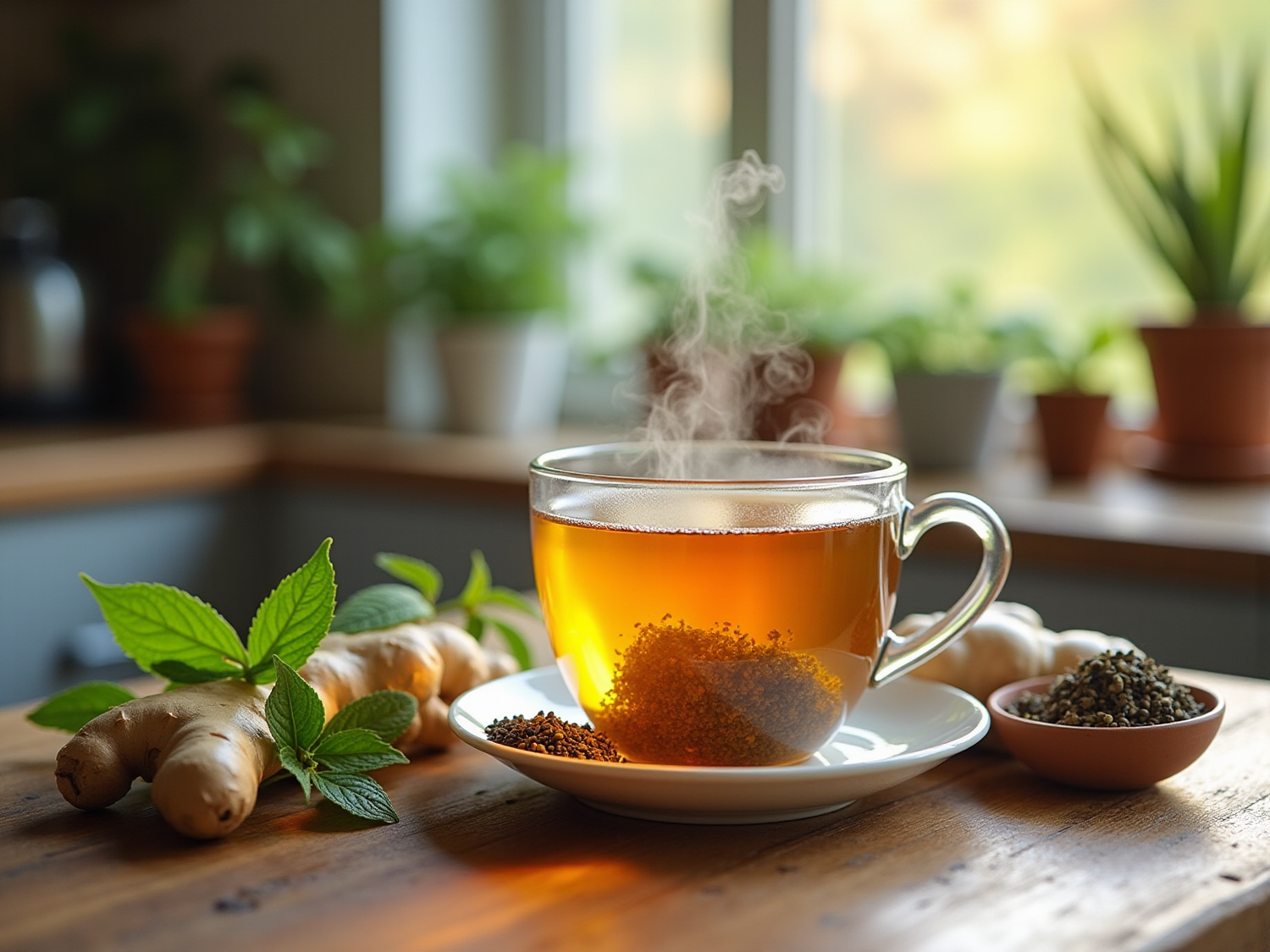
Overview
This article gently guides you on how to unlock the wonderful benefits of tea for digestion. It emphasizes the role of specific teas and proper brewing techniques in enhancing gut health, connecting with your wellness journey. Discover the digestive advantages of delightful options like green tea, peppermint, and ginger. Each tea offers unique benefits, and we provide a step-by-step guide on brewing methods that maximize their health benefits. By choosing the right teas and preparing them thoughtfully, you can significantly improve your digestive wellness.
Imagine sipping a warm cup of ginger tea after a meal, feeling your body relax and your digestion ease. In addition, peppermint tea can soothe your stomach, while green tea supports overall health. By exploring these options, you can find the perfect tea to accompany your wellness routine.
As a result, we encourage you to dive into the world of tea and discover which varieties resonate with you. Your journey towards better digestion can be both enjoyable and rewarding. Let the comforting ritual of brewing tea become a cherished part of your day, nurturing your body and spirit.
Introduction
In a world where health trends come and go, tea stands as a timeless ally for digestive wellness. With its rich history and diverse varieties, tea not only offers a comforting ritual but also serves as a powerful tool for enhancing gut health. The polyphenols found in true teas, particularly green tea, along with the soothing properties of herbal blends like peppermint and ginger, work together to alleviate digestive discomfort and promote overall well-being. As research increasingly highlights the connection between gut health and overall vitality, understanding the best teas for digestion and how to brew them effectively becomes essential. This article explores the remarkable benefits of tea for digestion, identifies the top selections for digestive health, and provides practical brewing tips to unlock their full potential.
Understand the Benefits of Tea for Digestion
Tea has long been cherished for its wonderful health benefits, particularly as a soothing option for digestion that supports gut health. The polyphenols found in tea, such as catechins and flavonoids, play a vital role in nurturing gut flora, reducing inflammation, and enhancing gastrointestinal motility. Remarkably, research indicates that authentic beverages, like green teas, boast at least double the polyphenol content compared to herbal varieties, making them especially advantageous for digestion.
For example, studies have shown that green teas can significantly improve digestion after hearty meals by promoting enzyme release. Herbal teas, particularly peppermint and ginger, are well-known for their calming properties and effectively help ease common stomach issues like bloating and gas. Nutritionists emphasize the importance of these herbal ingredients, with Farrell Allen noting that fennel, peppermint, and ginger have traditionally been used to support stomach function.
Consider Gardenika's Ayurvedic Detox Blend, crafted from organic lemongrass, echinacea, and dandelion. This delightful herbal infusion not only encourages stomach function but also provides immune support. As a caffeine-free option designed for holistic wellness, it’s an excellent choice for health-conscious individuals looking to enhance their stomach comfort and overall well-being. Plus, it features certified organic ingredients and comes in an eco-friendly loose-leaf style, ensuring a pure and natural experience free from artificial additives.
Moreover, recent studies highlight the significant role of gut microbiota in overall wellness, suggesting that dietary changes, such as incorporating tea for digestion, can help maintain a balanced gut microbiome. This balance is essential for preventing chronic diseases and promoting overall well-being. The activation of bile acid receptors by metabolites from gut microbiota has been linked to improved glucose metabolism and insulin secretion, further underscoring the benefits of herbal infusions.
In summary, incorporating a variety of blends, such as Gardenika's Ayurvedic Detox Blend, into your daily routine can be a gentle and effective way to enhance gastrointestinal wellness. With their rich polyphenol content, antioxidant properties, and mild detox benefits, both authentic and herbal teas provide invaluable support for anyone seeking to improve their gut health. Why not explore these wonderful options today and discover the nurturing benefits they can bring to your wellness journey?
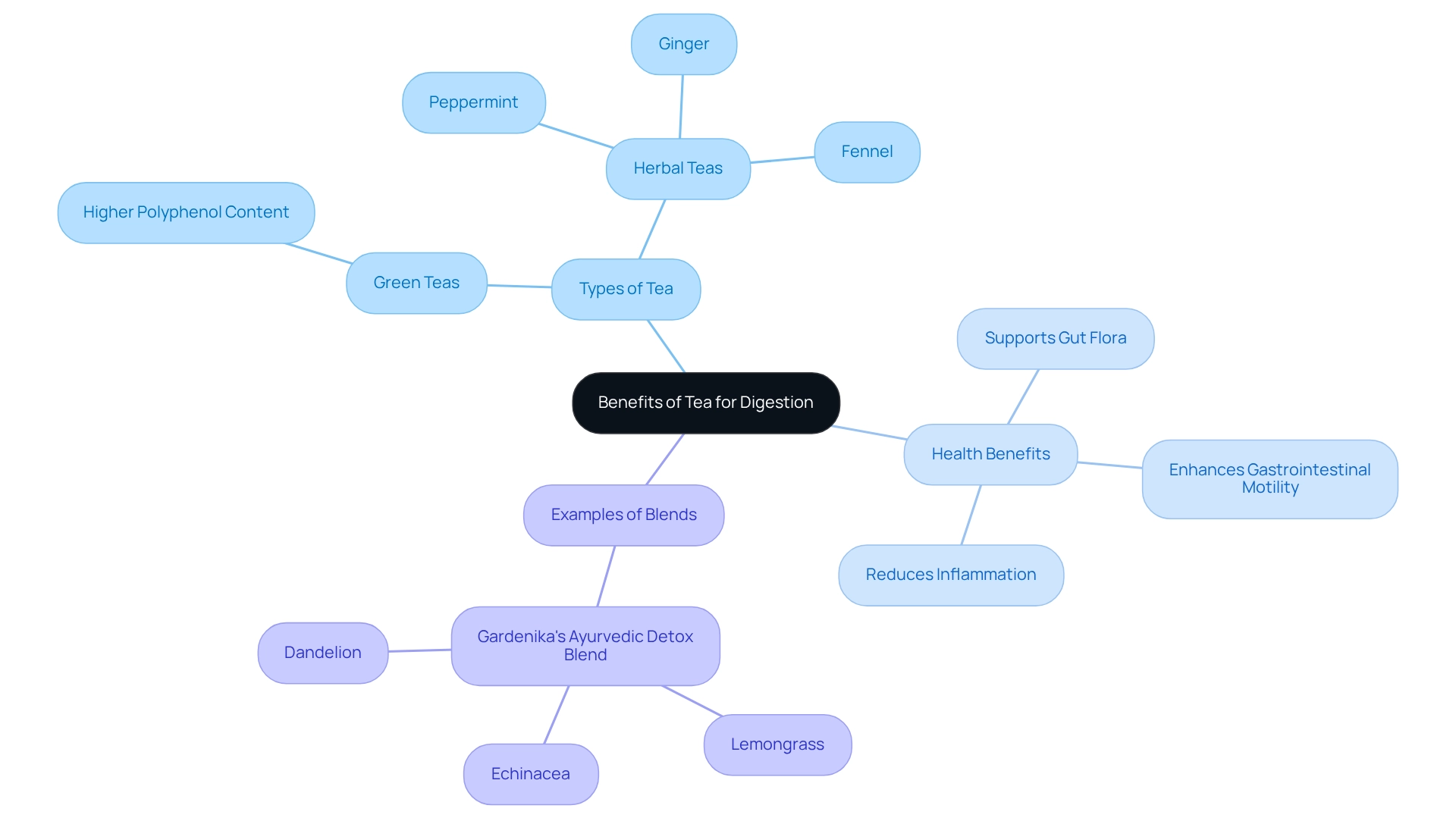
Identify the Best Teas for Digestive Health
When considering gut wellness, it’s important to explore specific teas for digestion that truly stand out, especially those offered by Gardenika. Discover balance with our organic loose leaf teas designed to support your health journey. Here are some of the best options for tea that can aid digestion:
- Peppermint Tea: This delightful tea is known for its ability to relax the muscles of the gastrointestinal tract. It can help relieve symptoms of bloating and gas, promoting overall wellness and comfort.
- Ginger Tea: Renowned for its anti-nausea properties, this tea stimulates digestion, making it a wonderful choice for anyone experiencing indigestion. Gardenika's ginger blend combines traditional herbs to enhance its effectiveness.
- Chamomile Tea for Digestion: Frequently utilized for its soothing effects, chamomile tea can also lessen inflammation in the gut and assist with acid reflux, contributing to a balanced system.
- Fennel Tea: Fennel is effective in minimizing bloating and gas, making it an excellent tea for digestion after meals. Gardenika's organic loose leaf fennel tea supports your body's natural functions beautifully.
- Green Tea: Abundant in antioxidants, green tea serves as a beneficial tea for digestion, promoting overall digestive well-being and improving digestion after heavy meals, aligning perfectly with Gardenika's commitment to holistic wellness.
Moreover, many of these blends draw inspiration from Ayurvedic principles, encouraging a holistic approach to wellness. Selecting the right tea for digestion based on your personal needs can greatly enhance your overall gut health. With Gardenika's organic blends, you can savor relaxation and immune support in every sip. Why not shop now and start your journey towards better gut health?
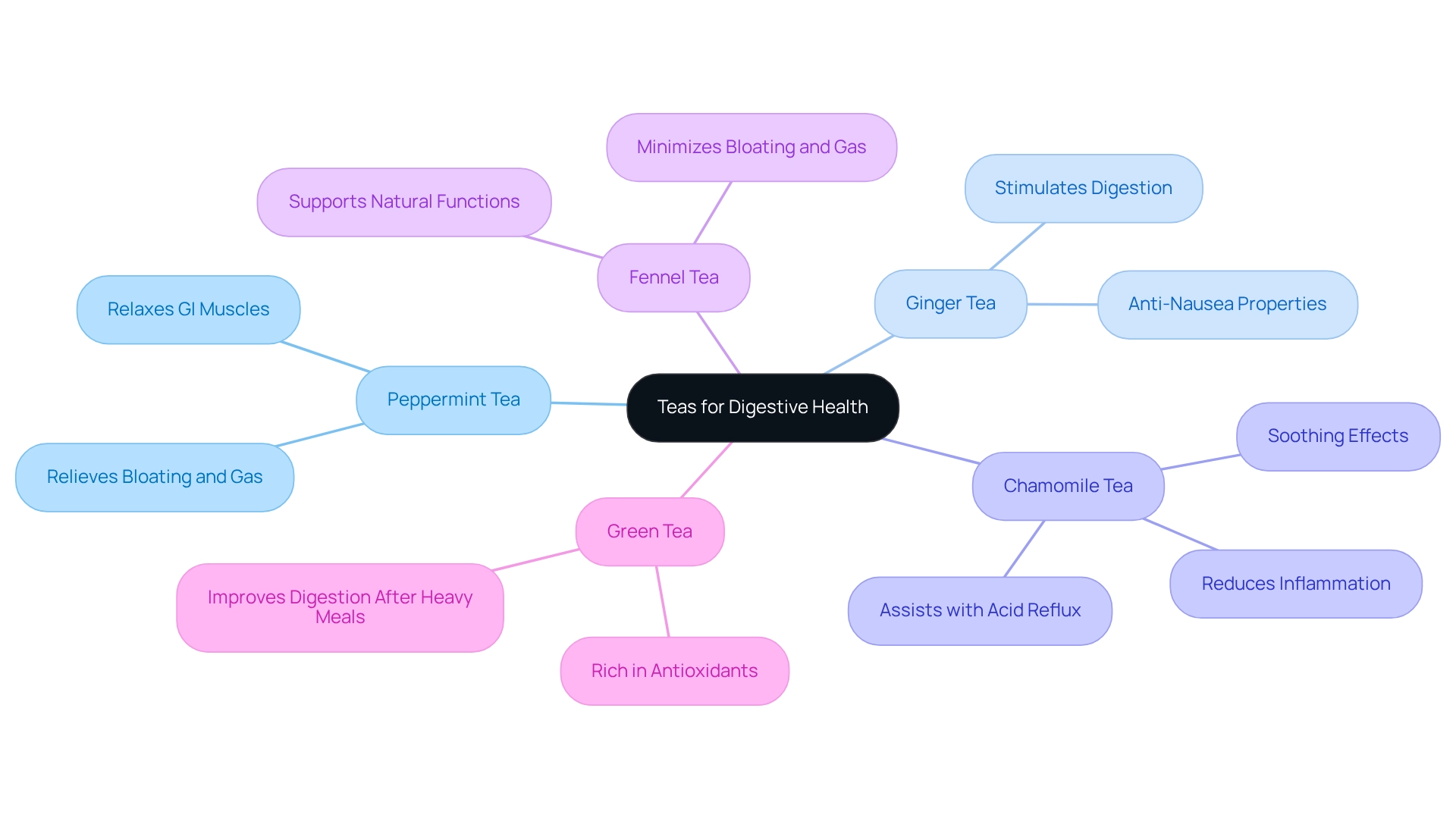
Learn How to Brew Tea for Maximum Digestive Benefits
To fully harness the benefits of tea for digestion, proper brewing techniques are essential. Let’s explore a simple step-by-step guide that can help you enjoy your tea to the fullest.
-
Choose Quality Beverage: Start by opting for high-quality loose leaf or bags from trusted sources, such as Gardenia. Their premium organic loose leaf selections and Ayurvedic blends promote wellness and balance, backed by over 2000 five-star reviews. Isn’t it comforting to know you’re choosing the best?
-
Measure the Tea: For optimal flavor and benefits, use approximately 1 teaspoon of loose leaf tea or one tea bag per cup (8 oz) of water. This careful measurement ensures you savor every drop.
-
Heat the Water: Different types of tea require specific temperatures to unlock their unique flavors:
- Green tea: 160-180°F (70-80°C)
- Herbal teas (like peppermint or ginger): 200-212°F (93-100°C)
-
Steep the Tea: Steeping times are crucial for extracting flavors and health benefits:
- Green tea: 2-3 minutes
- Herbal teas: 5-7 minutes
-
Cover While Steeping: Covering the tea while it steeps helps retain heat and essential oils, enhancing both flavor and health benefits. This process allows the beneficial compounds in the tea for digestion, such as antioxidants and anti-inflammatory properties, to be fully released. As a result, you promote better digestion and overall wellness.
Once steeped, strain and serve your tea, removing the tea leaves or bag. Enjoy it either hot or iced, whichever suits your mood. By adhering to these steps, you can maximize the digestive benefits of your tea, nurturing both your body and spirit.
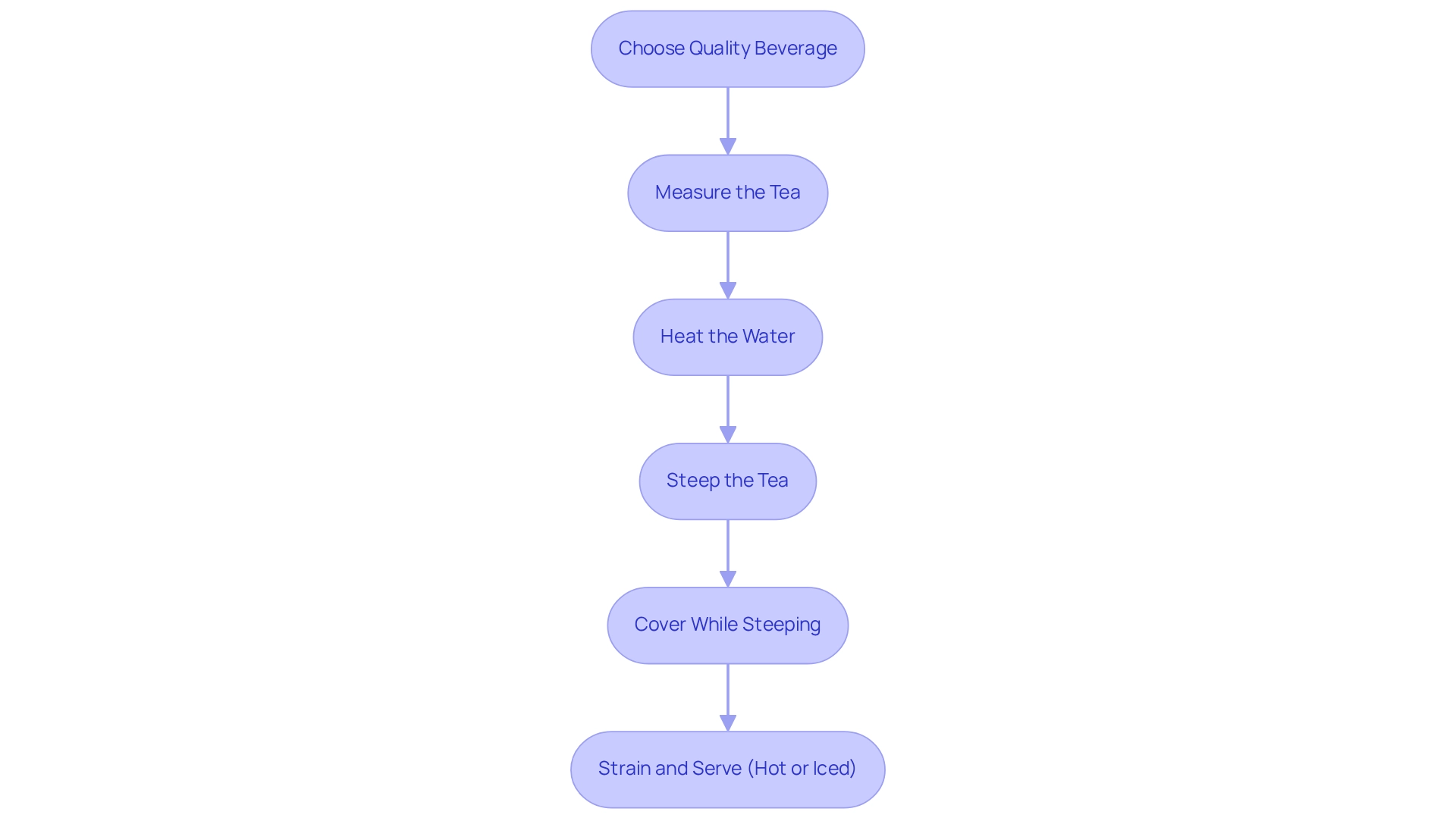
Troubleshoot Common Tea Brewing Issues
Even seasoned tea drinkers can encounter challenges during brewing, and it's completely normal to feel a bit frustrated. Let’s explore some common issues and their effective solutions together:
-
Tea Tastes Bitter: This often happens when the water is too hot or the tea is steeped for too long. Solution: Opt for cooler water for delicate infusions and reduce the steeping time to keep that bitterness at bay.
-
Tea is Too Weak: If your tea lacks flavor, it might be due to not enough tea leaves or water that isn't hot enough. Solution: Try increasing the amount of tea leaves and ensure the water reaches the right temperature for optimal extraction.
-
Cloudy Tea: This can often occur with iced tea due to rapid cooling. Solution: Allow your tea to cool gradually before refrigerating to maintain that lovely clarity.
-
Unpleasant Aftertaste: This issue can arise from stale tea or low-quality water. Solution: Use fresh, filtered water and store your tea in a cool, dark place to keep it fresh.
Addressing these common brewing issues can significantly enhance your tea-drinking experience. By doing so, you'll fully enjoy the digestive benefits that herbal teas provide. Research suggests that proper tea preparation not only elevates flavor but also offers health advantages, such as reducing lead levels in drinking water. A study found that brewing a typical cup of tea can remediate about 15% of lead from water, even at concentrations as high as 10 parts per million.
As Shindel notes, "Some people brew their tea for a matter of seconds, and they are not going to get a lot of remediation. But brewing tea for longer periods or even overnight — like iced tea — will recover most of the metal or maybe even close to all of the metal in the water." This highlights the importance of quality brewing practices. It’s worth noting that many consumers are generally unaware of the health properties of tea.
Educating yourself on these practices is essential for maximizing the benefits of tea. So why not take a moment to explore these brewing techniques and enhance your tea experience today?
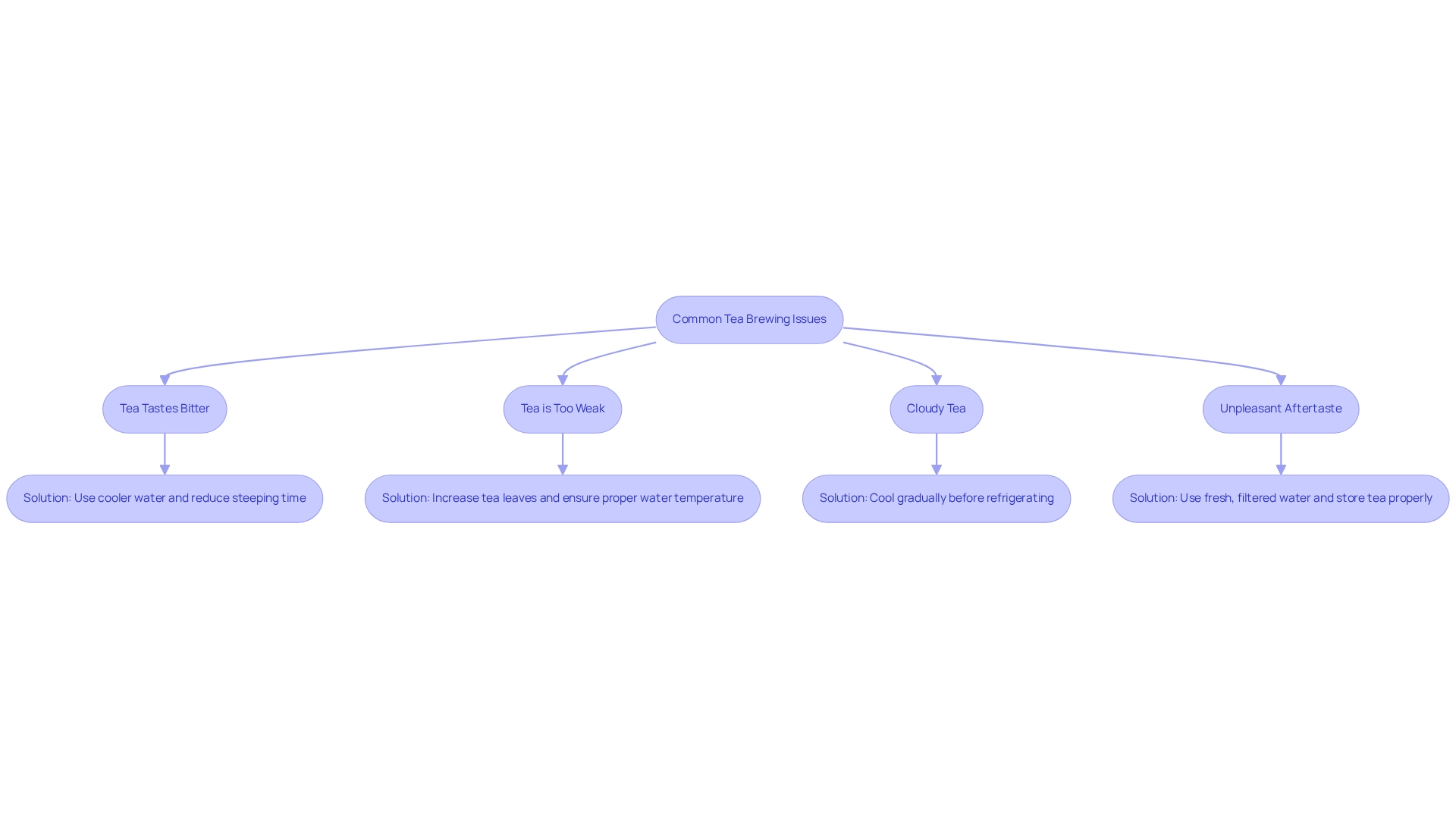
Conclusion
Incorporating tea into your daily routine can be a transformative step towards enhancing your digestive wellness. With its rich array of polyphenols and soothing herbal properties, tea serves as a gentle remedy for various digestive issues. From the invigorating effects of green tea to the calming qualities of peppermint and ginger, each variety offers unique benefits that contribute to overall gut health. By emphasizing the importance of quality ingredients, such as those found in Gardenika's blends, you can amplify these health advantages even further.
Understanding the best teas for digestion is crucial for your wellness journey. Options like peppermint, ginger, chamomile, fennel, and green tea not only provide relief from common digestive discomforts but also promote a balanced gut microbiome. These selections, inspired by holistic practices, can be tailored to your individual needs, ensuring that you can find a blend that resonates with your specific digestive concerns.
Proper brewing techniques play a vital role in unlocking the full potential of these teas. By following the recommended steps for measuring, steeping, and serving, you can maximize the flavor and health benefits of your tea. Addressing common brewing challenges ensures a pleasant experience, enhancing both enjoyment and health outcomes. Ultimately, embracing tea as a daily ritual can lead to improved digestive health and a greater sense of well-being. This makes tea a timeless ally in your journey towards holistic wellness, inviting you to explore and enjoy the nurturing benefits it offers.
Frequently Asked Questions
What health benefits does tea provide for digestion?
Tea is known for its health benefits, particularly in supporting gut health by nurturing gut flora, reducing inflammation, and enhancing gastrointestinal motility.
What are polyphenols, and how do they relate to tea?
Polyphenols, such as catechins and flavonoids, are compounds found in tea that play a vital role in promoting gut health and improving digestion.
How does the polyphenol content in green tea compare to herbal teas?
Green teas have at least double the polyphenol content compared to herbal varieties, making them particularly beneficial for digestion.
Which types of tea are effective for improving digestion after meals?
Green teas have been shown to significantly improve digestion after hearty meals by promoting enzyme release.
What herbal teas are known for their calming properties and digestive benefits?
Herbal teas such as peppermint and ginger are well-known for their calming properties and are effective in easing common stomach issues like bloating and gas.
What are some traditional herbal ingredients recommended for stomach function?
Fennel, peppermint, and ginger are traditionally used to support stomach function.
What is Gardenika's Ayurvedic Detox Blend, and what are its benefits?
Gardenika's Ayurvedic Detox Blend is an herbal infusion made from organic lemongrass, echinacea, and dandelion, which encourages stomach function and provides immune support. It is caffeine-free and designed for holistic wellness.
How does gut microbiota relate to overall wellness?
The gut microbiota plays a significant role in overall wellness, and dietary changes, such as incorporating tea for digestion, can help maintain a balanced gut microbiome, which is essential for preventing chronic diseases.
What are the antioxidant properties of tea?
Both authentic and herbal teas have rich polyphenol content and antioxidant properties that provide support for gut health.
How can incorporating tea into a daily routine benefit gastrointestinal wellness?
Incorporating a variety of tea blends into your daily routine can enhance gastrointestinal wellness through their mild detox benefits and support for gut health.



